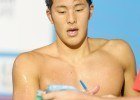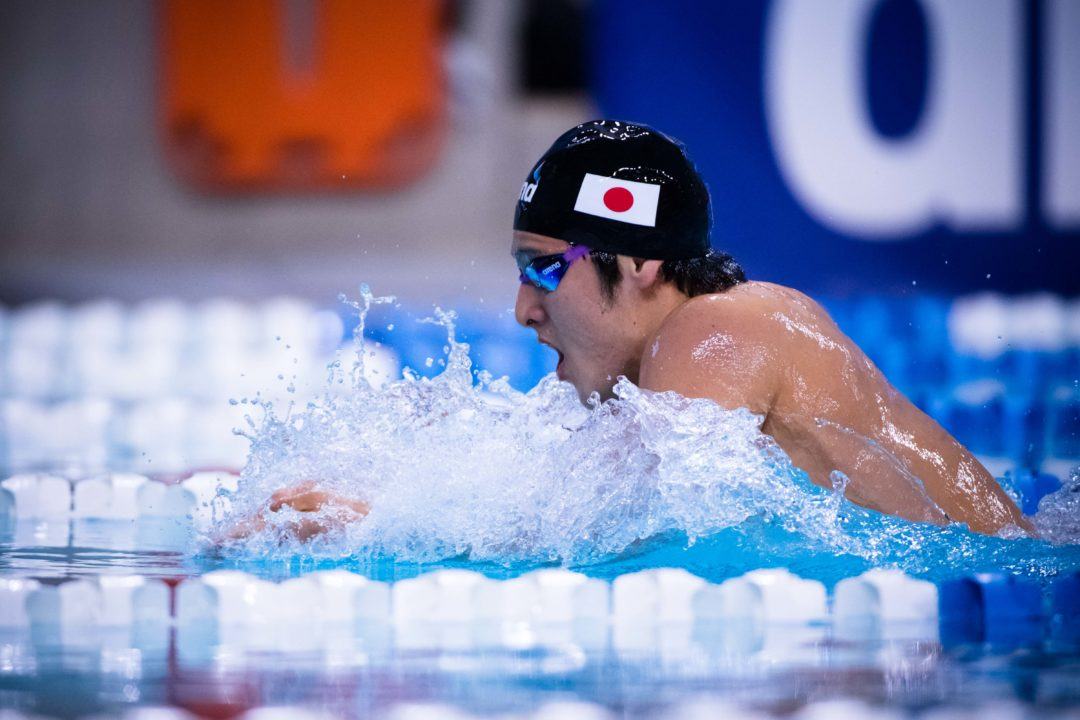
2019 JAPAN SWIMMING CHAMPIONSHIPS
- Tuesday, April 2nd – Monday, April 8th
- Tatsumi International Swimming Center, Tokyo, Japan
- LCM
- Qualifying Meet for 2019 World Championships
- Meet Site
- SwimSwam Preview
- Psych Sheets (in Japanese)
- Day 1 Recap/Day 2 Recap/Day 3 Recap/Day 4 Recap/Day 5 Recap/Day 6 Recap
- Results
- Live Stream
The 2019 Japan Swimming Championships concluded tonight, but throughout the meet the absence of stars Kosuke Hagino, Rikako Ikee and Hiromasa Fujimori was felt. Ikee is battling leukemia, while Hagino is battling mental fatigue in his journey to Tokyo. Fujimori tested positive for a banned substance just last month and is battling that doping case.
However, the athletes who were in the Tatsumi International Swimming Center pool fought hard and did their best to try to snag spots on the Gwangju roster despite extremely stiff qualification standards laid down by the Japanese swimming federation. The idea is that the federation wants to take bonafide finalists to Gwangju, not just swimmers who will compete.
Athletes who have not yet hit QTs will still have a chance to make the World Championships squad with performances at the Japan Open Swim next month.
24-year-old Japanese Olympic medalist Daiya Seto topped off his 2019 Japan Swimming Championships with a bang, collecting his 3rd individual title of the meet. After taking home the gold in the men’s 200m IM and 200m fly, earning World Championships bids in each, the new Dad fired off his fastest 400m IM time of the year to take home more hardware to his new daughter.
Seto clocked a big 4:09.98 winning 400m IM time tonight to beat out Yuki Ikari, who touched in 4:13.54. For Seto, his time represented the only man of the field to dip under the 4:13.09 QT needed for Gwangju. His time beat out the 4:12.60 he produced last year at the Pan Pacific Championships for bronze and was less than a second off of the 4:08.79 he threw down for gold in Jakarta at the 2018 Asian Games.
Seto was already 4:09.25 in January of this year, a mark which remains as the top time in the world.
2018-2019 LCM MEN 400 IM
SETO
4.07.95
| 2 | Jay LITHERLAND | USA | 4.09.12 | 07/28 |
| 3 | Max LITCHFIELD | GBR | 4.10.94 | 04/18 |
| 4 | Charlie SWANSON | USA | 4.11.46 | 08/09 |
| 5 | David VERRASZTO | HUN | 4.11.90 | 06/22 |
Yui Ohashi accomplished a World Championships-qualifying feat to follow in the women’s edition of the 400m IM, doubling up on her 200m IM title from earlier in the meet. Tonight Ohashi stopped the clock at 4:33.02. That’s enough to dip under the 4:36.35 QT, even though two-time Pan Pacs gold medalist has been faster this year with the 4:32.00 established at the Kosuke Kitajima Cup earlier this year.
Sakiko Shimizu earned runner-up status tonight in 4:39.37, but the Pan Pacs bronze medalist in this event needs to try again at the Japan Swim next month, as her time fell shy of Gwangju qualification.
Naoki Mizunuma got the job done in the men’s 100m fly, hitting the QT with his winning mark of 51.43. He represented one of two athletes under the 52-second threshold in the race, with Yuki Kobori right behind in 51.97. Takaya Yasue earned bronze in 52.02.
The minimum time standard was 51.47, so Mizunuma’s time slid under the mark by just .04.
The remaining events on this final night of competition were without qualifiers, meaning swimmers will need to perform better at next month’s Japan Open Swim,, which represents the final qualification meet for Gwangju. Among them is Shinri Shioura, who nailed a new National Record last night in the men’s 50m free in 21.67, but swam just a few hundredths slower tonight to hit in 21.73.
That’s still the 2nd fastest Japanese swim of all-time in the event, but every hundredth counts, with his 21.73 falling outside the 21.71 that would have rendered him automatically qualified. Kousuke Matsui took silver in 22.07, while bronze went to Koushiriou Sakai in 22.13.
Surprisingly, the former national record holder until last night, Katsumi Nakamura, finished just 4th in 22.30 after already being under 22 this year.
The women’s 50m free felt Rikako Ikee‘s absence, as have her other go-to events, with Rika Omoto filling the void with a time of 25.02. She needed 24.54 to make the Gwangju grade, so look for the 21-year-old to do some damage next month.
Omoto has proven she has what it takes, registering a time of 24.98 earlier this year in Adelaide, Australia to become the 3rd fastest Japanese swimmer of all-time in the event.
The men’s 50m back saw veteran Ryosuke Irie take his 3rd title of these championships with a winning time of 24.95, but the mark is outside the 24.56 stiff standard needed for the World Championships.
The story was the same in the women’s breaststroke, where Satomi Suzuki took the 50m title in 30.88, the only sub-31 second swimmer of the field, but needed 30.30 for Gwangju.
Rio Shirai took the women’s 200m back title in 2:09.58, a new personal best by over 2 seconds. That’s a tremendous achievement and we’ll see if she can continue the progress into next month’s Japan Swim in order to qualify for Gwangju.
Finally, Ayatsugu Hirai nailed a winning mark of 15:08.00 in the men’s 1500m free, but needed a 14:54.07 minimum to add his name to the World Championships roster. Hirai took gold in this event at the 2015 World University Games in a mark of 14:56.10, so it would take a personal best and his fastest time in 4 years to make it onto the squad.
